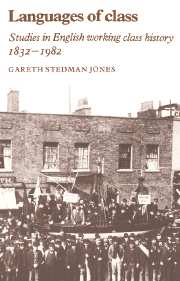Book contents
- Frontmatter
- Contents
- Acknowledgements
- Introduction
- 1 Class struggle and the Industrial Revolution
- 2 Class expression versus social control? A critique of recent trends in the social history of ‘leisure’
- 3 Rethinking Chartism
- 4 Working-class culture and working-class politics in London, 1870–1900: Notes on the remaking of a working class
- 5 Why is the Labour Party in a mess?
- Index
1 - Class struggle and the Industrial Revolution
Published online by Cambridge University Press: 08 January 2010
- Frontmatter
- Contents
- Acknowledgements
- Introduction
- 1 Class struggle and the Industrial Revolution
- 2 Class expression versus social control? A critique of recent trends in the social history of ‘leisure’
- 3 Rethinking Chartism
- 4 Working-class culture and working-class politics in London, 1870–1900: Notes on the remaking of a working class
- 5 Why is the Labour Party in a mess?
- Index
Summary
John Foster's Class Struggle and the Industrial Revolution is a remarkable contribution to English historiography. It represents both a continuation of, and a stark contrast to, the impressive tradition of social history which has grown up in Britain in the last two decades. If the best work of English social historians has largely grown within a Marxist tradition, that Marxism has been lightly worn. Mainly as a reaction against the positivism dominant within social science, English social historians have tended to disguise sharp analytical distinctions, and eschew sophisticated quantification or explicit theorization. If their guiding lines have been Marxist, they have also drawn much from a native socialist tradition, a tradition which remembered Capital as much for its moral passion as its theoretical achievement. Moreover, their methods of approach have by no means been inspired solely by Marxist sources. The less positivistic realms of sociology have obviously been drawn upon, and economic history of the more traditional kind has always provided a bedrock of support. But it is above all a drawing nearer to social anthropology which has most distinguished modern social history from traditional labour history. Ideas like ‘moral economy’, ‘primitive rebellion’ and general attempts to reconstruct ‘history from below’ have been attempts not only to relate forms of social thought and behaviour to their material roots, but also to uncover the social meaning of lost or disappearing forms of struggle, ritual or myth and to reconstitute their coherence.
Information
- Type
- Chapter
- Information
- Languages of ClassStudies in English Working Class History 1832–1982, pp. 25 - 75Publisher: Cambridge University PressPrint publication year: 1984
